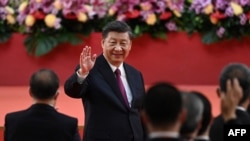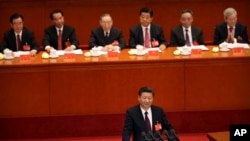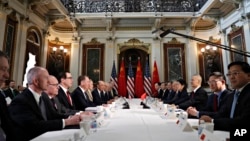As Chinese President Xi Jinping prepares to accept a precedent-breaking third term in office at a Communist Party summit in October, a new study of global public opinion trends shows how views of China in the United States and other advanced economies have declined throughout his tenure.
In recent years, those declining views worsened following Beijing’s mishandling of the coronavirus outbreak, according to the Pew Research Center.
Xi took office in 2012, when global public opinion of China had been relatively consistent. Then in 2017, polls indicated that opinion started to significantly worsen, with the most dramatic declines coming from 2019 to 2020. Researchers attributed the drop in favorability to concerns about military power and human rights issues.
“The places where people are particularly concerned about China's involvement in their domestic politics; or China's neighbors, which are particularly concerned about China's military; or places that view China's human rights as a particular problem tend to have more negative views of China,” Laura Silver, co-author of the report and senior researcher at the Pew Research Center, told VOA Mandarin.
Views of Xi’s leadership
Xi, 69, appears set to win another term as China’s top leader at the Chinese Communist Party congress that begins in Beijing on October 16.
Views of Xi started as quite negative in 2014, just a year after he took office, and have become increasingly negative in recent years, Washington-based Pew said.
Xi's tenure has involved a number of controversies, including China's military expansion in the South China Sea, the suppression of mass pro-democracy protests in Hong Kong, human rights abuses against Uyghurs and the increasing consolidation of Xi's personal power.
By 2022, majorities in all but two advanced economies surveyed by Pew had little to no confidence in his approach to world affairs. In Australia, France, Sweden and Japan, more than half of respondents had no confidence at all in Xi. But in Malaysia and Singapore, more than 60 percent of respondents said they had confidence in Xi.
“He's not doing particularly well relative to the other leaders that we asked about,” Silver said. “We asked on this particular survey about [American] President Biden, [French] President Macron and [German] Chancellor Scholz. What we found is that he is much less popular than those three leaders in almost every country that we surveyed. The only leader he's quite a bit more popular than is [Russian President] Putin.”
China’s zero-COVID pandemic policy is also blamed for negative views of China and the lack of confidence in Xi. In 2020, around half or more in every country surveyed thought China had handled the pandemic poorly. In the U.S., Sweden, Denmark, Australia, South Korea and Japan, two-thirds or more of respondents felt this way.
Silver noted that since the original survey, although China’s strict COVID policies appear to have been more effective in containing the spread of COVID-19, this has not led to an overall positive view of China among respondents.
China as an economic superpower
Despite China's economic rise and growing overseas investments, Beijing's international image has not become more positive, according to Pew.
In Australia, for example, 53 percent of respondents in 2020 considered China to be one of the world’s dominant economic powers. This does not seem to correlate with popularity, with this year's poll showing that 86 percent of those surveyed held unfavorable views of China.
China is a top trading partner for the U.S., but 82 percent of the U.S. respondents held a negative view of China this year, up from 79 percent in 2020. This number was higher than in most countries surveyed.
For many advanced economies, including the U.S. and Australia as well as Japan and South Korea, economic competition with China was seen as a “serious problem,” according to Pew.
China’s human rights was the issue that concerned people most. In the U.S., Canada, Australia, South Korea, Japan and every European country surveyed, a majority of respondents has consistently said, since the question was first asked in 2008, that the Chinese government does not respect the personal freedoms of its people.
In nearly all places surveyed, those who see China’s human rights policies as a very serious problem are more likely to favor promoting human rights regardless of economic consequences.
Countries that are geographically close to China generally have a more negative view of China, citing China's military expansion and its interference in their domestic politics.
More than 80 percent of respondents in the Philippines, Vietnam, Japan and South Korea said they were very or somewhat concerned about military conflict with China.
Most respondents, however, did not conflate their attitudes toward the Chinese government with their attitudes toward the Chinese people.
The survey noted that respondents are generally referring to China’s leadership or government, not the people, when thinking about China.
“The people are basically good, but leader Xi is too controlling and should not be in power this long,” said a U.S. respondent to Pew.






